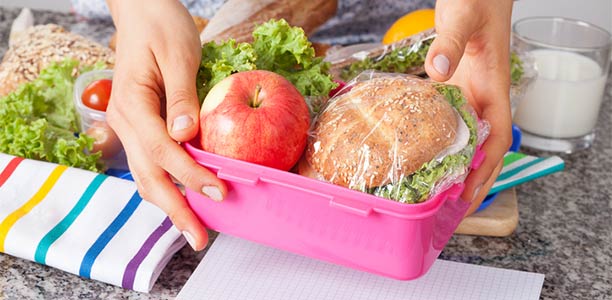Parents packing school lunches during the summer heat have been urged to prepare food and store it in the refrigerator overnight to help keep the meal cool for longer, according to a gastroenterologist from Western Sydney University.
Dr Vincent Ho from the School of Medicine says temperature plays a very important role, as bacteria flourish in a ‘danger zone’ between 5 and 60 degrees Celsius.
He says food such as meat, cheese, fish and milk can spoil and take an offensive odour during the summer heat, but the bacteria that causes food to spoil is quite different to the bacteria that typically cause food poisoning
“At-risk foods are hard to spot, as the bacteria responsible for the majority of cases of food poisoning don’t change the appearance, smell or taste of food,” he says.
“A thin slice of a well-washed tomato with 100 bacteria at 8am could contain just over 26 million bacteria by 2pm on the same day,” he says.
However there are simple safety precautions parents can take to really help to minimise the risk of foodborne illness to children.
Dr Vincent Ho suggests parents preparing food should follow the advice provided by The United States Department of Agriculture Food Safety .
- Cleaning means washing hands thoroughly before food handling and using clean utensils and cutting boards.
- Separating foods is important to minimise the risk of cross contamination. Separate cutting boards should be used for fresh produce and raw meat/poultry to reduce the risk of Salmonella related illnesses.
- Cooking food to the right temperature using a food thermometer is sensible.
- Chilling of perishable foods such as meats, eggs, cheese or yoghurt with at least two cold sources e.g. freezer packs, will keep harmful bacteria from multiplying rapidly.
He says the packing of food is just as important as food preparation, and can help avoid food related illness.
“Frozen juice poppers can also be used as freezer packs and by lunchtime should be thawed and ready to drink. Perishable food should never be packed in a paper bag, especially in the summer heat,” he says.
“An insulated lunchbox should be used for packing perishable foods. Insulated containers such as thermos flasks should be used to store hot soups and stews.”
Dr Ho says if food poisoning does occur, oral rehydration is the cornerstone of treatment.
“A rehydrating solution of sugar, salt and water can be purchased from most pharmacists and drinking this is the first step to recovery. A bland diet for a short period of time can be helpful in recovery,” he says.
“For severe symptoms or for any concerns about your child’s recovery arrange a prompt review by your general practitioner.”
(Source: Western Sydney University)










